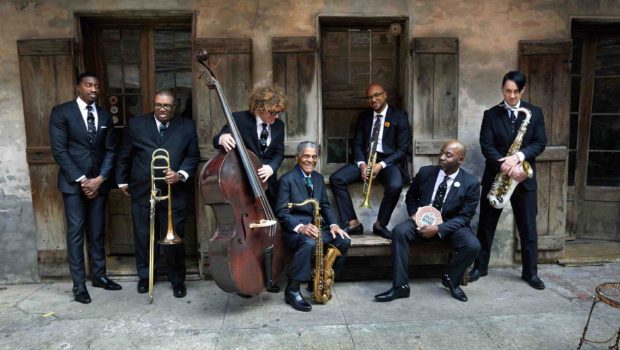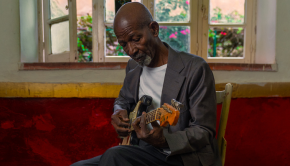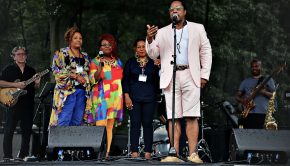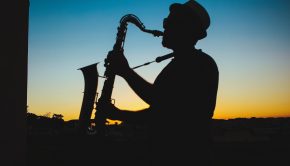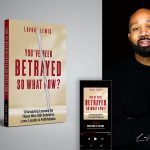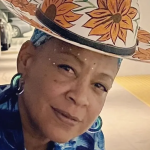Preservation Hall Jazz Band releases ‘So It Is’
Preservation Hall Jazz Band releases a new album titled “So It Is,” featuring all-new original music, coming April 21 via Legacy Recordings. The septet’s second release finds a mesh of the classic Preservation Hall Jazz sound aligned with the Afro-Caribbean grooves of Cuba. Since the band toured the island in 2015, they have immersed their creativity into their musical counterparts. “It is important for the Preservation Hall musician, who are part of some of the biggest families in New Orleans music, to grow and have experiences and to immerse themselves in a process of discovery, says Ben Jaffe. But while in Cuba, they found themselves in the face of their musical counterparts and an undeniable connection between Cuba and New Orleans which is the premise of “So It Is.”
“There’s been a connection between Cuba and New Orleans since day one – we’re family. A gigantic light bulb went off and we realized that New Orleans music is not just a thing by itself; it’s part of something much bigger. It was almost like having a religious epiphany.” — Ben Jaffe
Produced by David Sitek, the founder of art rock innovators TV on the Radio who has lead projects by Kelis, the Yeah Yeah Yeahs and Santigold, now joins Preservation Hall Jazz Band to present “So It Is.” The music is written by Ben Jaffe and saxophonist Charlie Gabriel in collaboration with the entire Preservation Hall Jazz Band. The band continues to redefine what it means to play New Orleans music by tapping into their Afro-Cuban roots. Reflected in their most recent release, “So It Is,” shares a common ancestry with the Afro beats of Fela Kuti and the music of Pharoah Sanders and John Coltrane. Preservation Hall Jazz Band features cutting edge artists who have shared festival stages with some of the greatest names in the industry.
Ben, thank you for joining The Hype magazine. How are you today?
I’m doing alright. It’s been a heavy week. We have had some deaths in our musical family. But it’s interesting the way New Orleans is – like the way that we deal with death is like through celebration. It’s like a beautiful way to help a family deal with a transition like that, you know through music and joy. So, we are dealing with that today. In fact, I’m talking to you right now outside a cemetery. I just came from a funeral from one of our trombone players, who plays for Preservation Hall. His son passed away and we memorialized him with a Jazz funeral. That just wrapped up about 30 minutes ago.
Sounds like a tragic ending to the beginning of your “So It Is” tour.
It all comes back to the Preservation Hall Jazz Band and the community that we grew up with. In New Orleans, we really turn to music for strength, for joy and for celebration. Music is a spiritual rite of passage. There is honor in music in New Orleans. Even though we are going out and having a good time and having fun, it’s a part of who we are. It’s embed in our DNA. I feel like “So It Is,” captures that in such an incredibly beautiful way! You can hear the history of our music, and you can feel the rhythmic pulse of Africa. It makes you want to dance and celebrate! It feels like you are in a spiritual church, and everyone is throwing their hands in the air, speaking in tongues and just jumping for joy! That’s what I feel is New Orleans music!
Not only is there a connection with Africa but a connection with Cuba in your latest album “So It is.” What can you tell me about that?
Cuba has a deep and long history with New Orleans. Cuba predates New Orleans by I don’t know how many hundreds of years, but Cuba and New Orleans once had a system of trade leading right up to the 1950’s during the embargo. A lot of people felt like an embargo on Cuba was also an embargo on New Orleans, because it completely cut off our trade. In New Orleans, one of our biggest trade partners was Cuba and Hatti. That was the triangle. You know, you are trading goods, but you know you are also sharing a history. You are importing ideas and bringing people and communities and you are intermarrying. A lot is happening. We were able to rediscover that when we visited Cuba in 2015. Leading up to that, just knowing what influence Cuba has had on New Orleans, and our music and history, going there you could taste it. You could taste the same elements of Africa that you could feel in New Orleans and that you could taste and feel in Cuba.
When I think of Cuban music, I think of bands like Buenos Vista Social Club or Jazz musicians like Bebo Veldes. They encapsulate and Afro- Caribbean style. What does the Preservation Hall Jazz Band take from that style?
They are like our Cuban counterparts. If we looked in a mirror, we are looking at them. What we are looking at is something that is slightly different because our histories are slightly different. We are an African and French country and they are more of a Spanish and African country. The ingredients are in a different balance. But we pretty much see ourselves in them. In New Orleans, we syncopate our rhythm and we emphasize the two and the four, which is the offbeat or the back beat. That is what gives our music its swing. It gives our music a pocket. In Cuba, they emphasize the one and the three. It’s interesting because it has its own unique and yet deep pocket. It’s not quite the syncopated rhythm that you feel in New Orleans, but it’s still there. Like we still have the one and the three beats in New Orleans music.
You are the Bass player. You play the Tuba and some percussion, and you are also the creative director of Preservation Hall Jazz Band. This is a role rooted in cultural preservation. How has “So It Is,” related to the cause?
It is important for the Preservation Hall musician, who are part of some of the biggest families in New Orleans music, to grow and have experiences and to immerse themselves in a process of discovery. They are walking pillars of our community in New Orleans. They can also share their New Orleans experience with other communities who have also embraced their musical history the same way New Orleans does. So, it is not just Cuba! There are communities all over the world that have strong musical identities. One of the things I’ve come to realize is that we are part of a global family of musicians. We are a part of a global movement in music. That is powerful! That is one of the many things I’ve learned to understand about New Orleans music and Preservation Hall Jazz Band’s role in all of this.
Tweet
